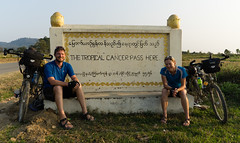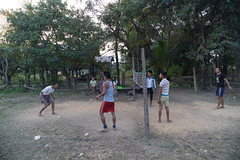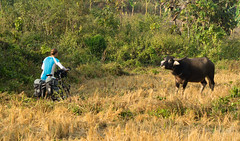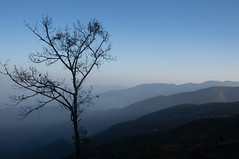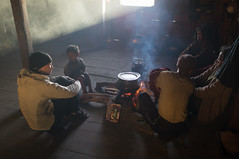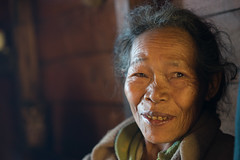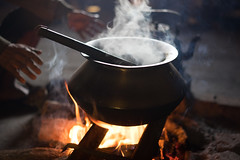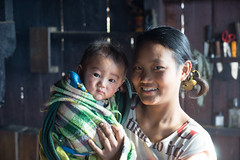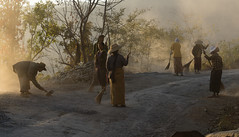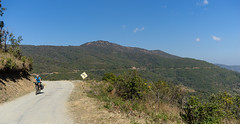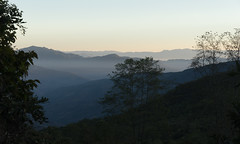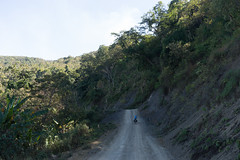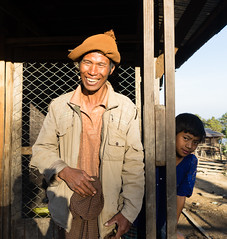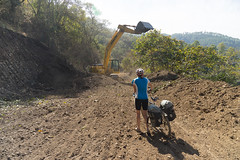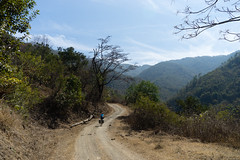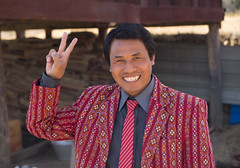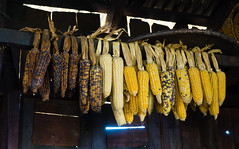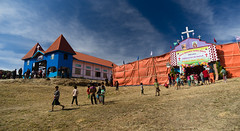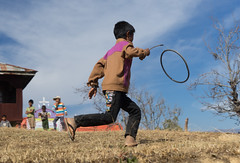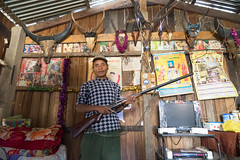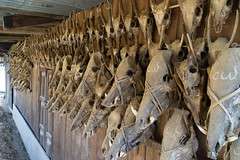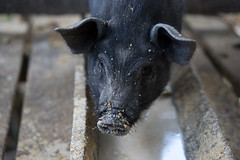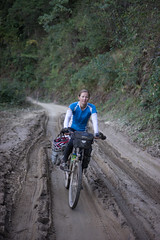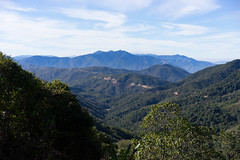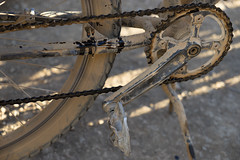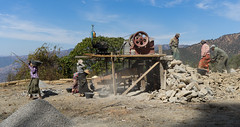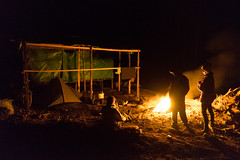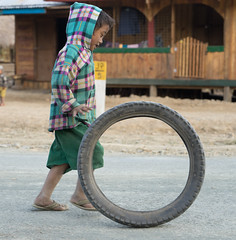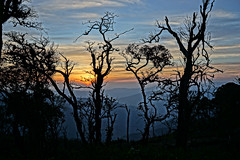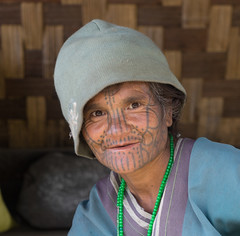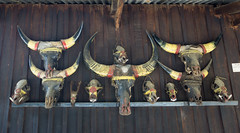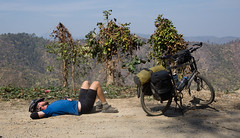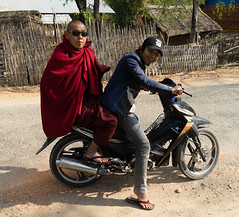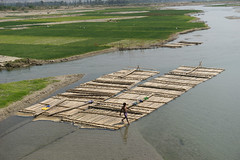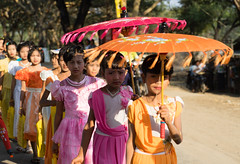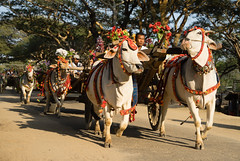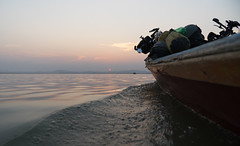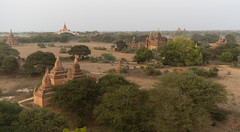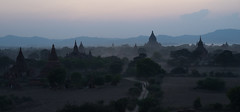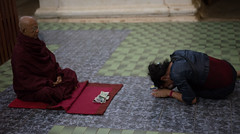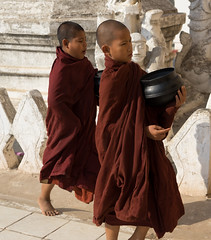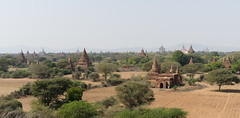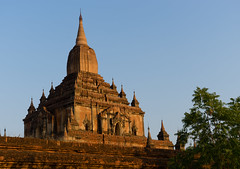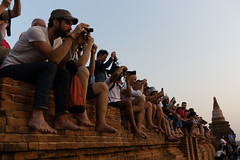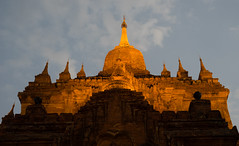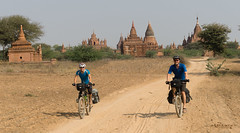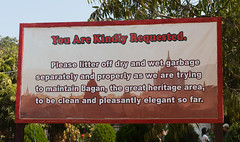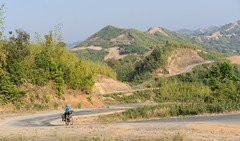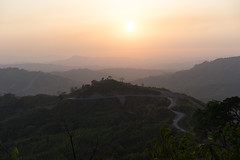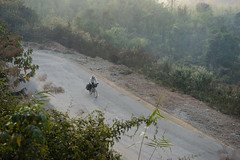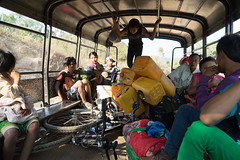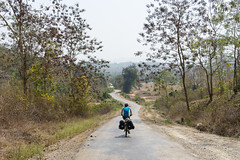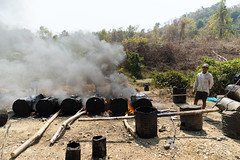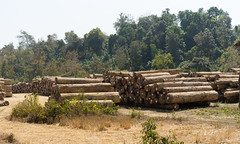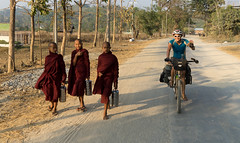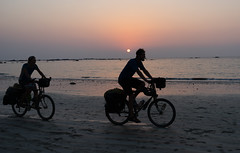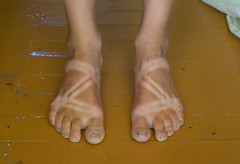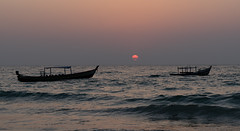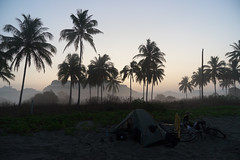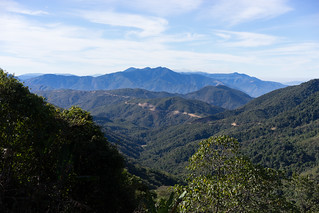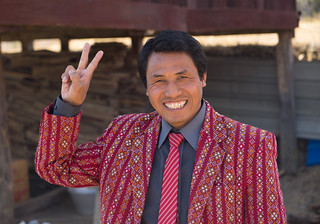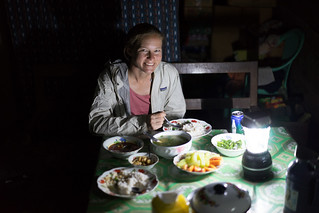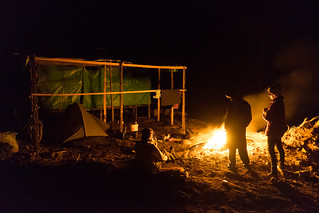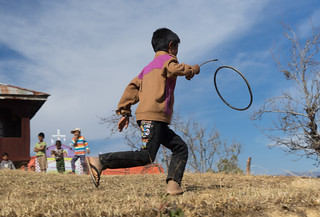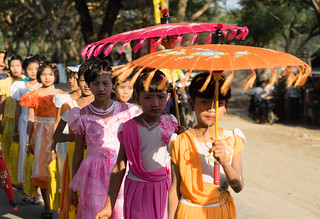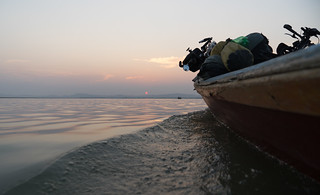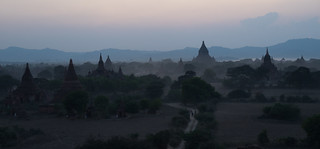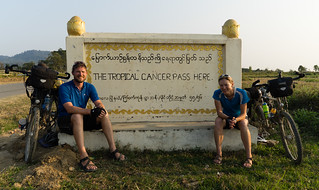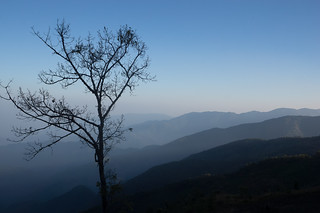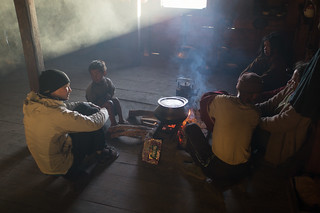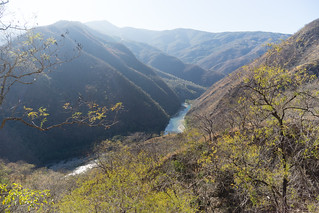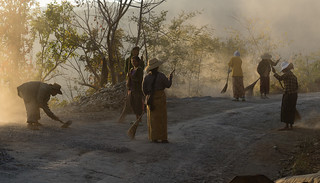Below are our best pictures from 35 days of riding in Myanmar. You can also look through our Flickr albums from different parts of the state: three days in Sagaing Region, two weeks on the mountain roads of Chin State, central Myanmar and Bagan, the coast (and more mountains) in Rakhine State, and finally, the country’s largest city, Yangon.
Archive for the ‘Myanmar’ Category
Photos from Myanmar
Tuesday, March 3rd, 2015Myanmar II – Hakha to Bagan
Tuesday, February 10th, 2015We left Hakha around sunrise to get an early start to what would end up being nine days without a shower, bed, or internet, and a diet that consisted primarily of ramen noodles. Shortly after Hakha, the beautiful pavement ended and we spent the rest of the week on dirt. We found few proper restaurants on this stretch, but on our first day we found a nice place called ‘Heaven Cafe’ in the village of Satka. The woman running it spoke some English and went off on her motorbike to get eggs when we asked to have some in our noodles, which was the only thing they sold other than coffee. Like all of the Chin villages we encountered, Satka was strung out along the road, which was following a ridge, so we enjoyed the view and the ambience of the little roadside cafe, where we were the only customers. We camped for several nights in a row, sometimes with beautiful views into the valleys below, and sometimes hidden in thick secondary forest. One night we were close to a stretch of road construction, and the bulldozers seemed to go all night. By this time, we no longer had a full moon so we had to use our headlamps, but we were careful not to shine them towards the road and went undetected every night.
One day, we were invited to stay in a village celebrating its Golden Jubilee, or 50-year anniversary. We had stopped to find lunch, and as there was no restaurant we were taken to the pastor’s house and fed there. A young woman who worked at the church happened to speak English and played tour guide. She explained what was happening for the Jubilee and invited us to attend the celebration and spend the night. She also took us to a funeral service for a young woman who had died the night before. We were still in our bike clothes and she marched us right up and into the house where the woman had been laid out in a tiny room, all her relatives around her. I felt so out of place and inadvertently disrespectful until the first person reached out to shake my hand. Then the next, and the next, and I found myself kneeling on the wooden floor, having just caught my first glimpse close-up of a dead person, a total stranger who had died after a long illness, leaving her 3-year-old daughter behind, while her loved ones welcomed us. I shook every hand that came toward me, hoping something in my posture, my murmured attempt at ‘hello’ in the local dialect of the Chin language, would show them my sympathy, my condolences.
Later our friend took us to the big tent where the Jubilee events were set to happen later that day, but we had barely come in when she and another young man told us we’d have to go – the headman of the village was worried that police might come out to the Jubilee from the closest town, Rezua, and that he might get in trouble if we were found there. They could call and ask, she said, and there was a chance they might say yes, but the village authorities were afraid. That was enough for us, and soon we were on our way, although we were sad to miss the celebration. When we got to Rezua we stopped to buy the basics, but nobody wanted to sell us anything. Instead, they wanted to give us things. We managed to pay for some eggs and condensed milk, but the rice and rum we hoped to buy were given to us by smiling women more excited to greet foreigners than to make a buck.
We were prepared to camp, but again it was very hilly, with every flat space occupied by a village. We asked a couple outside of their house for water, and then we asked if there was anywhere we could sleep. They smiled and gestured up the hill, and we rode on, uncertain of what they’d meant. When we got to the top of the hill, we found ourselves in the main village, and an old woman greeted us as if she’d been waiting for us. I joked that the couple must have called ahead, but there was no cell reception there. The woman led us to the house of a young woman who spoke English, who then brought us to a large house where an older couple lived. We would stay there, she said, and also pointed to a cistern out back, indicating that we should wash up. After so many days on a dirt road, she had a point. We cleaned up as best we could while remaining fully clothed, and also washed our bike clothes as we were now down to one outfit each. We made our ramen, then hung out briefly with the couple. They made no effort to communicate, but our beds were laid out in their living room so perhaps they were just going about their normal routine. We shared some chocolate and looked at family pictures, and then everybody went to bed.
The next night we stayed in another village just past Matupi, one of the larger towns in the area. Although there were police in this town, and a military camp nearby, Chin State overall felt so remote that I had lost my fear of the police, as long as we weren’t in big towns that had police stations. The headman of the village waved us down as we went through his village near sunset. Again, it was like they were waiting for us. He invited us to stay in another family’s house where we were served dinner. They ate after us, which made us sad as we would have liked to eat with them. (It also would have given us a better idea of how much food they had, so we wouldn’t overeat and inadvertently leave them with too little, which was something we worried about.) However, we weren’t lonely – the headman and two teachers, all of whom spoke fairly decent English, talked with us all evening. The headman told us his brother was a refugee living in New York – apparently he had angered the soldiers from a nearby military camp for protesting their destruction of a cross, and had to leave.
Before leaving us for the night, the headman brought out a big register book and asked us to write down our names and the date. He told us he would let the authorities in Matupi know that we had stayed there, and suddenly I was afraid again. “Are you sure that’s OK?” we asked. We had heard that local people often don’t know the rules related to foreigners, and we were worried he and the family who hosted us would get in trouble. We also preferred to stay off the authorities’ radar, just in case we weren’t supposed to be there. He said it was fine, though, and we didn’t really have other options. So we registered ourselves and hoped everything would be fine. With respect to the authorities in Chin State, everything was fine; with respect to my belly… not so much. I woke up in the middle of the night feeling feverish and sick to my stomach, and only felt slightly better in the morning. Fortunately the family had one of the nicest outhouses I’d seen in Myanmar, and with the help of some Cipro we were on our way.
We camped the next night with a few construction workers, and the following night we found a beautiful spot just past a small village where we’d stopped to refill our water bladder, fuel bottle, and flask. The woman running the ‘store’ didn’t seem to have a firm grasp of mathematics or business, so I tallied up the bill after coaxing the price of each item from her. David spent that stop trying his hand at the stick-and-wheel game that I believe was popular in the US in our grandparents’ generation, and is still ubiquitous in developing countries. It’s harder than it looks, but he provided great entertainment. We enjoyed more beautiful views on what turned out to be our last night camped up high.
The following day we passed through the large town of Mindat and saw our first tourist since Hakha. We also saw women with tattooed faces, an old practice – perhaps to identify them as members of the Chin tribe in case of kidnapping by other tribes – that seems to be dying out, as only older women had the tattoos. The night before we had climbed up to the highest point of our route through Myanmar, 2700 meters, and now we were on our way down. Unfortunately it was now David’s turn to feel sick and he couldn’t really enjoy the looping, paved descent. We cycled out of Chin State and soon started seeing Buddhist stupas again instead of churches. We stopped in a valley village to get water and camped off the road not far from some sort of temple blasting wailing tinky-tonky chanting music until past our bedtime, then starting up again before sunrise.
The next day we biked to Myit Chay, across the Irrawaddy River from Bagan, an area full of ancient temples and one of Myanmar’s most popular tourist destinations. A bridge crosses the river a bit to the east of Bagan, but crossing it would have added over 20 kilometers to an already long day. Plus, Bangladesh had taught us that where there are towns on two sides of a river, there is usually a boat. We started asking around, and sure enough we were told that we could get a boat in Myit Chay. When we got to the town, we asked some friendly men where we could find a boat, and they said to turn left, go for one or two miles, then turn right again and go for another one or two miles. Simple enough, we thought.
On our way to the river, we encountered a group of people wearing Bogyoke (“General”) Aung San shirts, and a big truck all bedecked with posters. General Aung San is considered to be the father of modern, independent Burma, and is well-loved by most of the population. Internationally, he is perhaps better known as the father of Aung San Suu Kyi, the face of Myanmar’s democratic movement who was famously kept under house arrest by the military junta that ruled Myanmar from the 1960s until very recently. It turned out that the following day would have been General Aung San’s 100th birthday, and his hometown was nearby so they were preparing for a big celebration.
Next, we came across a parade of little girls on dressed up horses, young women carrying platters of fruit, and men driving oxcarts festooned with flowers. It was a procession to a Buddhist site – we’re not sure exactly what for, but we were the only foreigners – and the only spectators – so people stopped and posed for photos and waved and smiled. It was a couple of hours before sunset and the light was just right – I felt like we had stumbled onto our own private parade, done solely for the participants and just happening to have an audience of two, us.
After a mile or so, we asked a street vendor how to get to the river. The man gestured vaguely onward so we proceeded, but within a few minutes a man rode up to us on his motorbike and indicated that he would show us the way. Thank goodness for him, or we never would have found the river. For about 20 minutes we wound down tiny dirt paths through fields where women were harvesting crops, waving at us as we rode by. Eventually he turned off and pointed us to the last bit towards the river. We’d thought he happened to be going that way, or had a boat, but no, he was just taking time out of his day to show two strangers the way. We thanked him and continued on, and soon found ourselves at the shore of the Irrawaddy River.
A group of intoxicated young men were sprawled around a volleyball net, and when we asked about a boat they enthusiastically indicated that yes, they could take us. Nyaung-U, the main town near the temples, was directly across the river, and they offered to take us there for 5,000 kyat (~$5). But we wanted to go to Old Bagan – the main temple area, and a bit farther downstream – so we could see the temples from the water at sunset, and this seemed to confuse them tremendously in their drunken state. I thought it was a language thing, but soon a man arrived on a motorbike who spoke good English. He translated, and it seemed that they understood, but would charge 15,000 kyat to go all the way to Old Bagan. No problem, we said, let’s go. But then they put us on the boat going to Nyaung-U. Confusion reigned, and we weren’t sure we wanted one of these wasted men to pilot us and our bikes across the river. Then another boat arrived, and the boatman seemed sober.
He seemed to understand our request, so we pulled our bikes out of the first boat and walked to his. All seemed to be going well until one of the drunk men, who we nicknamed ‘White Skull’ for the logo on his t-shirt, hopped in. No, we said, we want to go with the other man, the one who is sober. So sober guy hopped in, and nodded solemnly when we indicated that he was to drive. White Skull fired up the engine, and again we pointed to sober man. Again he nodded, and moved towards the back of the boat, but when I looked back, White Skull was driving, grinning away. We figured he couldn’t do too much damage, and if he started to steer us astray we’d have sober guy take over. White Skull got us safely to shore, and we got our first glimpse of the temples as the sun set over the river. Then we biked to Nyaung-U – where we actually planned to stay – and found a nice hotel, one of the most expensive of the trip, but we didn’t care. Unbeknownst to us, another bout of GI problems was settling in, and we needed to rest.
Bagan was an interesting place, but due to being sick and exhausted from our crazy ride through Chin State, we spent most of our time there relaxing at the hotel. We got out to see the temples a few times, always on our bikes, and we joined all the other tourists for sunset at Shwesandaw Pagoda. Bagan is probably the most visited place in Myanmar, and we certainly saw more foreigners there than anywhere else in the country, but somehow it didn’t feel overrun. There were still monks strolling around, and local people seemed happy to talk to us. There was western food, which we appreciated with our weakened stomachs, and decent ice cream if you looked hard enough, and people hawking art and trinkets at the major temples. Still, Nyaung-U felt like a sleepy town that just happened to have a thousand or so temples scattered around it. There was an entrance fee of $20 for the whole site, but they only checked tickets at the major temples. At smaller ones we were usually the only tourists there, and gatekeepers would let us in to roam around while kids played soccer outside. We stayed one night longer than intended, waiting for our stomachs to recover, then rode out of Bagan, aiming for the coast.
Myanmar I – Tamu to Hakha
Thursday, February 5th, 2015We arrived in Moreh, the border town between Manipur and Myanmar, around lunchtime. Our permits just had arrived by email, so we found a place to print them out (even though we had been assured that a copy had also been sent to the border post). Then we ate lunch at a typical ‘rice hotel’ – a common name for lunch spots in Northeast India – where we were approached by a man with a thermometer who told us we had to have our temperatures taken to ensure that we didn’t have ebola. They wouldn’t let us into Myanmar otherwise, he said. So we got our temperature taken and received a certificate indicating that we were healthy, and then proceeded to the border.
We had a little trouble finding the Indian checkpoint – it was a much bigger building than at the border with Nepal, but it wasn’t clearly marked and there were no other travelers there. Once we found it, we had to track down some officials, who, after digging up an ink pad and some stamps – apparently not a lot of foreigners cross here – checked us out of the country. We then rode through a no-man’s-land of burning garbage piles before crossing a bridge and seeing the sign reading “India-Myanmar Friendship Highway.” After all of the planning, reaching the Myanmar border felt particularly momentous. We parked our bikes on the street next to a steep staircase leading to the customs building. This was it – the moment of truth. Would they let us in? A bored-looking man in a blue lungyi (sarong) told us to sit, then fetched the permits that the travel agency, Seven Diamond, had sent to him. It all seemed fairly routine, like they let foreigners cross every day, which felt contrary to our experience getting out of India, just across the river. We began to suspect that the permit wasn’t even necessary and it was all a racket to squeeze extra money out of tourists. He stamped our passports and wrote in the 30 days we were allowed to stay. Nobody had appeared to collect our money and we thought we might be able to just leave, but he told us to wait for our ‘guide.’
Eventually a young man with a mouth stained red from betel nut appeared on a motorbike, and we were released into his care. He didn’t ask for money, just motioned for us to follow him, so we did. We rode a few kilometers to the border town of Tamu, where he said he’d show us to our guesthouse. We weren’t expecting this, and we asked if we had to stay there. He told us we were free to stay anywhere we wanted, but first asked for the $200 we owed him for the permits. We handed it over (two crisp $100 bills saved for this very purpose) and rode around the town, which consisted of a few blocks on each side of a T-section. With some difficulty we accomplished our tasks: changing rupees (we were told to look in the market but nobody there could help; instead we found an Indian man at a clothing shop called Mizo, on the main road about half a kilometer past the turnoff to the market) and getting a SIM card (there were lots of places selling them in the market, but we never could get the data to work!). We looked for a cheaper guesthouse, but only saw one hotel that looked so unpromising we didn’t even check. We went back to the first place, had dinner at a “beer station” (after months in countries where alcohol was hard to find, and rarely available at restaurants, we decided we were going to like Myanmar), and turned in.
The next day we biked towards Kale, about 90 miles away. Myanmar uses both miles and kilometers (as well as furlongs, which refer to the length of a furrow in an agricultural field, and are 1/8 of a mile), and sometimes people use the terms interchangeably to refer to the same distance. This caused us a few navigational problems during our time in the country. We took a long lunch break, enjoying the leisurely feeling of this very relaxed country, and we didn’t make it to Kale that day. Near sunset, we went through a village and stopped to watch some guys playing chinlone, a local sport similar to volleyball in which small teams use their feet, heads, torsos – anything but their hands – to get a small rattan ball over a net. We made sleeping motions and gestured around, but people just pointed us down the road. We asked at several more places, following their outstretched hands; the place they pointed us to may have been an official’s house, but the people inside just stared at us. We had already gotten water, so we figured we’d test our luck and camp.
Almost every cyclist’s blog in Myanmar has stories of being discovered by the police and forced out of their campsites, so we knew we’d have to be stealthy. The area was pretty heavily populated, though, and all of the paths off the road led to fields and houses. Finally we decided to just strike out through an empty field, not following a path. We raced off the road when there were no cars coming by and crashed through the bushes; after a while we found ourselves in a harvested rice paddy with a couple of buffalo staked nearby, well hidden from the road. We pitched our tent and made dinner by the light of the full moon – we’d read on another couple’s blog that they never used flashlights when camping to avoid detection – enjoying the chirping crickets and comfortable site.
The next day we made it to Kale in the early afternoon. We met Guillome, a French Canadian traveler who had spent about a month in Myanmar. He’d been having a great time, taking boats and buses through Shan state and in the far south after crossing over from Thailand. He taught us that a hand waved vertically by your ear means ‘no.’ We had lunch (with beers) and dinner (with more beers) at a Chinese restaurant down the street from our hotel, where we were excited to speak Mandarin with the owners.
We left early the next morning and biked out of town, immediately beginning our climb into Chin State. The guidebook said some of the state was recently opened to foreigners, with the rest, presumably, still being closed. Seven Diamond, the agency that had arranged our border crossing permit, said that the capital, Hakha, which was about a third of the way down our intended route, was open, but that the other two towns we’d asked about farther down the road required a permit and guide. We figured we’d just go as far as we could and see what happened.
We climbed 2000 meters that day on a good paved road. Near sunset a young man on a motorbike passed us and asked, in his limited English, the usual questions – Where are you going? Where are you from? How do you like our country? – and invited us to stay at his house. We were thrilled, since the steep terrain meant camping would be difficult, but then he said his village was seven miles away. We were still going up, and we wouldn’t be able to make it by dark. So we promised to come to his house for breakfast the next morning, and, in the next village we encountered, asked at a church for a place to stay. David had barely mimed the sleeping motion and the old man was waving him in, pointing to a mostly-empty room.
We were a little wary of staying with villagers – we’d heard it’s illegal and that, while we probably wouldn’t get in trouble, local people who hosted us might. Since it was nearly impossible to camp, we thought a church might be a good bet as a last resort, since it wasn’t anybody’s home. Well, this church turned out to be attached to a home, and the family that lived there (presumably the pastor’s family) invited us to eat with them and later treated us to a sing-along concert that was crazy magical. Dinner was rice and some sort of green vegetable, cooked over a wood fire in the middle of the room. No chimney meant a smoky room, and the dim, battery-powered light coupled with the cooking fire and smoke and total lack of shared language made for a shadowy, quiet, sacred-feeling meal. This was the poorest family we stayed with on the whole trip, I think, and we tried to explain that we had our own food and didn’t need to eat theirs, but they weren’t having it. We then tried to share a plate of rice and not take much of the vegetables, as we’d had a good lunch, but again, no dice – they kept piling food on our plate and urging us to eat, and eventually, we complied.
The family consisted of an older couple, their son and daughter-in-law, and their three children, a teenage girl and two little boys, four and five years old. We ate in shifts around a low wooden table, sitting on tiny wooden benches a few inches off the ground. The girl ate last and alone, and as she did she occasionally burst into wild-sounding guffaws. Later I heard the same noise a few times in the middle of the night. She kept to herself, staring intently at nothing and not talking to anybody, and I think she must have had some sort of mental illness that affected her communication and behavior. The two boys were always by the side of their mother or grandmother, and the youngest, once he got used to us, kept sneaking big grinning glances at me. After the singing, they laid out a mat and a few blankets for us on the floor of the church room, then went to bed in a room next to the kitchen. In the morning they served us mugs of a hot cereal, and after efforts to convey our gratitude that could only fall short, we were on our way.
As we rode, we asked for the village of the young man from the night before, but we never found it. I do think I saw him though, out of the corner of my eye as we were descending, but it didn’t register until much later and I felt badly that we hadn’t stopped. However, later that morning we made another friend and went to church. After about ten kilometers we stopped in a village and tried to find a restaurant to supplement the cereal we’d eaten. A young woman who spoke good English took us to the only restaurant in town, but it was time for church and the owners didn’t have time to make breakfast for us. So the woman invited us to her house and made us scrambled eggs served with rice. We got out our coffee and had a nice breakfast. She’d learned English working as a maid in Malaysia, apparently a common things for girls in the area to do. She told us that some people are so poor that they don’t have enough food, so they send their daughters abroad to work. This unfortunately is often what happens when people get caught by traffickers and sold into an altogether different line of work.
This young woman had gone with an agent when she was 14 and worked for four years. Now she’d been back for a while – she was 23 – and was married with a 6-month-old son. She went to a different church than the restaurant owners, and we asked if we could attend the service. It had been years since I’d been to church, and I think the majority of my attendance as an adult has been outside of the US, meaning I rarely understand the services. Here, it didn’t matter. The Chin Baptist church just about converted me back to Christianity. Like the singing the night before, it defies description. We were both in a strange mental space – I’d gotten angry with David for not trying harder to find the motorbike man, and I think we were also just worn out from the road. I think our nerves were truly raw. Everything touched us, one way or another, and I was never far from tears those first few days in Chin State. Whether it was mystical chanting in a smoky room, our own attempts to sing Amazing Grace (at our hosts’ request – they were not impressed), the voices of a youth choir filling every corner of the chapel, a failure to keep a casual promise, or the beautiful contour of the road around the mountains, it just got to me.
After church we started riding again, up and up, and found a place to camp between bends in the road where the land had been cleared, probably for firewood to heat the tar used for road repairs. There was a lot of roadwork going on in Chin State – repairing the dirt roads from the landslides that must happen every rainy season, and widening and paving some stretches – with mixed-gender crews and entire families living in camps along the road. We were awoken before light by somebody firing up the tar fires, but he probably didn’t see us and we went back to sleep. The road crew arrived just as we were packing up, and when we started carrying our stuff up the sleep slope to the road, one of the men spotted us and rushed down to help us. The women all giggled at us from under their straw hats, no doubt wondering what on earth we were doing there, and we felt like the day had gotten off to a nice start.
We thought we might make it to Hakha that day, but people kept saying it was 20, then 15, then 13 miles away – too far to make it before dark. So we found a nice place to camp, but we hadn’t filled up our water bladder since we’d hoped to make it to town. We decided to use our water to make noodles for dinner and have breakfast in town; we were not happy campers the next morning. Still, the campsite was great – set well back from the road with a nice view of the surrounding valleys. We heard lots of gunshots from local hunters, and later we heard yipping and howling that was probably the local version of coyotes but sounded like tormented ghosts to me.
The ‘miles’ people had told us about turned out to be kilometers, and as we rolled into town early the next morning, we were frustrated to realize that we could have made it to Hakha the night before after all. A very kind hotel manager let us nap and shower in one of his rooms for free, and we also did some laundry. First, though, we ate a giant breakfast, and later a big lunch. It was getting later and later, and as we rode out of town around 4:00 David decided he needed to check email to set up some book events, try to arrange a talk in Yangon, and let our parents know we were alive. Of course the Internet place was down hill in the wrong direction, and by the time we finished it felt stupid to leave. So we ended up spending the night and had dinner with visiting World Vision workers, including an American who told us who had won the Super Bowl, days afterwards. David was thrilled; I wished we could have avoided hearing the news…







